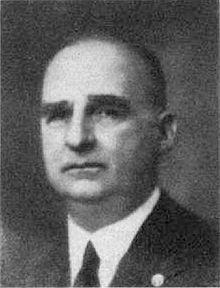This is an old revision of this page, as edited by KasparBot (talk | contribs) at 06:56, 15 March 2016 (migrating Persondata to Wikidata, please help, see challenges for this article). The present address (URL) is a permanent link to this revision, which may differ significantly from the current revision.
Revision as of 06:56, 15 March 2016 by KasparBot (talk | contribs) (migrating Persondata to Wikidata, please help, see challenges for this article)(diff) ← Previous revision | Latest revision (diff) | Newer revision → (diff)| This article does not cite any sources. Please help improve this article by adding citations to reliable sources. Unsourced material may be challenged and removed. Find sources: "Hermann Kriebel" – news · newspapers · books · scholar · JSTOR (January 2007) (Learn how and when to remove this message) |

Hermann Kriebel (January 20, 1876 in Germersheim – February 16, 1941 in Munich) was a retired lieutenant colonel and former Bavarian staff officer.
He fought with the Freikorps during the German Revolution of 1918–19 and in 1923 became the military leader of the Kampfbund, the league of nationalist and fighting societies that included Adolf Hitler's Nazi party and SA; the Oberland League; and Ernst Röhm's Reichskriegflagge. Kriebel was, with Hitler and Erich Ludendorff, the key figure in the November 8–9, 1923 Beer Hall Putsch and was convicted with Hitler in 1924, serving his sentence in the Landsberg prison just outside Munich.
After his release from prison, he maintained his ties with the Nazi party and the Oberland League but did not benefit from Hitler's rise to power. He became the German consul general in Shanghai. According to Time, as a member of the German 1919 Armistice delegation, his parting words were "See you again in 20 years."
Categories:- Articles lacking sources from January 2007
- 1876 births
- 1941 deaths
- People from Germersheim
- National Socialist Freedom Movement politicians
- German Nazi politicians
- Collaborators who participated in the Beer Hall Putsch
- 20th-century Freikorps personnel
- German diplomats
- German military personnel of World War I
- Nazis who served in World War I
- Military personnel of Bavaria
- Nazi leaders
- Members of the Reichstag of the Weimar Republic
- Members of the Reichstag of Nazi Germany
- People from the Palatinate (region)
- German nationalists